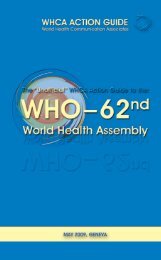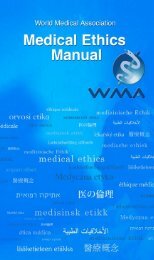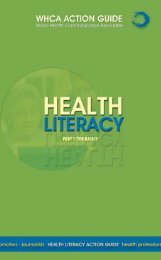the basics - World Health Communication Associates
the basics - World Health Communication Associates
the basics - World Health Communication Associates
- No tags were found...
You also want an ePaper? Increase the reach of your titles
YUMPU automatically turns print PDFs into web optimized ePapers that Google loves.
BOX 1 : SIX DOMAINS OF INFLUENCE ON HEALTH LITERACY(adapted from Kickbusch & Maag 2008)<strong>Health</strong> systems — <strong>Health</strong> systems play a major role in developing individual andpopulation health literacy skills. <strong>Health</strong> systems can be made more health literacyfriendly in a variety of ways. Workers may be trained to recognise <strong>the</strong> specific needs ofusers and assist <strong>the</strong>m in navigating systems. Information—such as forms, signs andletters—can be made more accessible and understandable. If done appropriately, thiscan help align system demands to user skill levels and improve user ability to accesshealth systems, assess risks, select appropriate pathways of care and engage in selfcare.<strong>Health</strong> systems can also advocate for and shape <strong>the</strong> ‘health literacy friendliness’of o<strong>the</strong>r systems and settings. They can do this by raising awareness of <strong>the</strong> negativehealth consequences of weak health literacy skills and, importantly, identifying goodpractice and advocating for more effective policies and interventions.Educational systems — Schools and o<strong>the</strong>r formal and informal educationalestablishments play a major role in developing literacy skills and fostering literacyin all countries. They help children and adults to learn about what influences <strong>the</strong>irhealth, <strong>the</strong> impact of <strong>the</strong> choices <strong>the</strong>y make and where to find reliable information tosupport decision-making. Learning may have benefits in terms of improving attitudesto and competencies for engaging in positive health behaviours and making best useof health services. Literacy improves employment prospects (with associated healthgains), ei<strong>the</strong>r by helping individuals to move out of unemployment or throughaiding progression in <strong>the</strong> labour market. Adult participation in learning may also bebeneficial for <strong>the</strong> next generation in terms of improving <strong>the</strong>ir chances of learning andhealth outcomes. The development of such literacy skills should be a priority andincluded in all school and adult education programmes, with particular emphasis onparental involvement in early years education.Media marketplaces — For many people, media marketplaces are a main sourceof health information. These marketplaces shape people’s health perceptions,behaviours and choices. Commercial and political interests often dominate, withinterested parties using sophisticated communication techniques to sell <strong>the</strong>irproducts and ideas. Public health advocates need to learn from commercialadvertisers and marketers. They can use <strong>the</strong> same approaches to help people makehealthier decisions when choosing goods and services. This could also serve tocounteract <strong>the</strong> negative influences of industries—tobacco, alcohol and fast food14SECTION 1: WHAT IS HEALTH LITERACY?






